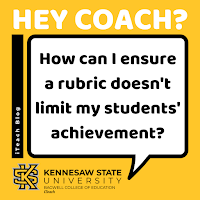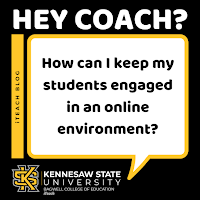Using Individual Paths to Increase Achievement
Hey Coach,
 I read a recent post on the iTeach blog about fostering risk-taking in the classroom, and it got me thinking about some of my unit projects. My students pride themselves on getting good grades, but this causes them to play it safe by letting the rubric completely dictate what they create. I worry that giving them a rubric limits what they could accomplish if they weren’t so concerned about exactly what they have to do to earn an A. I want my students to attempt new and challenging tasks as they dig deep and explore the subject of the project, but if I don’t provide a detailed rubric, my students and their parents panic! What can I do?
I read a recent post on the iTeach blog about fostering risk-taking in the classroom, and it got me thinking about some of my unit projects. My students pride themselves on getting good grades, but this causes them to play it safe by letting the rubric completely dictate what they create. I worry that giving them a rubric limits what they could accomplish if they weren’t so concerned about exactly what they have to do to earn an A. I want my students to attempt new and challenging tasks as they dig deep and explore the subject of the project, but if I don’t provide a detailed rubric, my students and their parents panic! What can I do?Sincerely,
Rubric Regrets
Dear Rubric Regrets,
Grading challenges are not an easy issue to deal with. Panic often sets in when students (and their parents) feel like there is not an explicit set of directions to get to that "A." The great news is that these challenges offer an excellent opportunity to drive our teaching practice forward! Here are some strategies and ideas to redirect your students away from a grade-centric focus.
Educators know that academic growth is paramount in student learning, but so often the focus is on how well our students do summatively. So what if you focused on a growth mindset? Carol Dweck is the growth mindset guru, writing a great deal of research on the efficacy of teaching growth mindsets. Her research shows that when we teach students that learning and intelligence are the result of devoting time and effort to challenging tasks, we see increased motivation and achievement in students. (Check out Dwek’s Mindset Works blog for more information and resources!) The Effective Effort Rubric is an excellent tool to introduce the components of a growth mindset to your class. Invite students to self-evaluate their current mindset and then ask them: “What is one area you would like to improve?”
As students strengthen their growth mindset, you can help them transition from their over-reliance on rubrics by allowing them to determine their own individual path. After introducing the objectives of your unit project, give students time to create a goal, plan the steps to achieve it, and track their achievement. You might find our Goal-Setting Templates to be helpful as students chart their own path in your classroom. Formative assessment would then be determined by the progress each student makes at preset intervals. If the student makes appropriate progress, he or she will earn an A. Determining what appropriate progress comes directly from the goal the student created. Therefore, the grade is entirely dependent on the student’s end goal, the path they determined, and the evidence of their learning.
Of course you and the student will need to share the goal, and the plan to achieve it, with the student’s parents. In this type of dynamic communication paradigm, all stakeholders have a clear understanding of what needs to be accomplished, but no one has spelled out the direct path to an A. Routine conferences with the student, formative assessment data, and student data collection will allow you to ensure the student is learning, and that learning is rigorous and relevant to content standards.
Conferencing and collecting data should not be laborious! You can use tools such as Microsoft Teams and Google Classroom to virtually conference with students. Data collection on the students’ growth mindset goals can be accomplished with a simple survey created using Google Forms or Microsoft Forms. Students can even provide evidence of their growth in the artifact they submit at the end of the project.
Kudos to you for wanting your students to explore their potential rather than being satisfied that the standards have simply been met! Educators need to remember that the standards are the minimum requirements for learning and not the end of learning. By allowing students to inform their own learning, the pressures on you will lessen, and the achievement of students will be unleashed.
Yours Truly,
Coach
Contributing coach Max Gertz
Edited by Anna Bilyeu, Ana Hale, and Kristen Klinger


Comments
Post a Comment